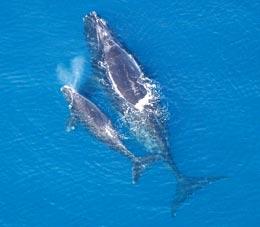
North Pacific right whales could be the victims of planned gas drilling in the Bering Sea.Florida Fish and Wildlife Conservation Commission/NOAA
Posted on 04/10/2008 11:00:06 PM PDT by neverdem

North Pacific right whales could be the victims of planned gas drilling in the Bering Sea.Florida Fish and Wildlife Conservation Commission/NOAA
The rising tide of global fossil-fuel prices is set to heighten the conflict between the US oil and gas industry and the interests of migratory whales, after two federal announcements both laid claim to the same piece of the chilly Bering Sea.
The contested region, part of Bristol Bay off the Alaskan coast, is one of the regions that has become more appealing for oil and gas drillers in recent years despite its inhospitable location. But conservationists warn that drilling and related activity will threaten endangered whale species that swim in icy northern waters. The two official notices, both made on the same day this week, make this all too clear.
The Federal Register is where US agencies formally announce rules and post notices. The 8 April edition contains two maps of the region — one in an announcement outlining an offshore area proposed to be leased to oil and gas companies for drilling, another in a notice delineating the final 'critical habitat' for the North Pacific right whale (Eubalaena japonica ) under the Endangered Species Act. The regions drawn up in the two maps overlap. See map
"The plain language of the Endangered Species Act is that federal agencies shall not destroy or adversely modify critical habitat," says Brendan Cummings, oceans programme director at Center for Biological Diversity based in Tucson, Arizona, a group of lawyers that campaigns through litigation for better federal protection of endangered species. "I don't see how any reasonable person can't see that putting in drilling platforms and seismic surveys — some of the loudest sounds in the ocean — isn't doing that."
Conflicting interests
Cummings and his colleagues noticed the coincidence in the Federal Register and sent out a press release underlining the endangered status of the whale. Conservationists estimate that there are fewer than 100 of the whales surviving off the US coast, with perhaps a few hundred more in the Sea of Okhotsk.
The whales have traditionally been favourites of whalers, and are even said to have got their name from being "the right whales to hunt", because they are so rich in whale oil. Now it seems that the few remaining whales could be threatened by US appetites for natural gas.
The reason is money, says Phil Clapham, head of the Cetacean Assessment and Ecology Program at the US government's National Marine Mammal Laboratory in Seattle, Washington. "It is because of massive profits deriving from oil and gas development."
Clapham is leading a series of research projects to investigate the right whale population between now and 2011, when the drilling rights are tentatively scheduled to be leased to the highest-bidding energy companies.
"The law doesn't automatically ban you from conducting commercial activities in a critical habitat," he adds.
Indeed, if the government can show that drilling activities won't threaten the whales then they can lease away. According to the Minerals Management Service, the agency that handles leasing out the government's mineral rights in federal waters, there might be 8 trillion cubic feet of natural gas under that 2.3 million hectares of sea and continental shelf.
The agency will have to show that the typically slow and sedate whales will be minimally affected by the drilling. Very little is known about how drilling activities affect North Pacific right whales, but some information can be inferred from their Atlantic cousins (Eubalaena glacialis ) which were, until recently, considered to be the same species. Atlantic whales mostly have to contend with ship traffic and fishing. "They get tangled in fishing gear and they get hit by ships a lot," says Clapham. "We don't know the extent that this may be affecting North Pacific right whales. We would like to try to figure that out. Entanglements leave scars and you can assess the frequency of entanglement by looking at them."
Drilling-specific threats include oil spills and seismic surveys, which use air guns to find out what might be under the seabed. The loud noises might change the behaviour of the constantly communicating whales, or even deafen them. The construction and operation of oil rigs will also increase ship traffic. "If a ship hits a whale, the whale usually dies," says Clapham.
Rising pressure
"We are very early in the process," says Robin Casy, a spokesperson for the Minerals Management Service. "It is not a done deal; this is just a first step. We have a little over three years to do an evaluation."
Casy says that some land might be removed from the sale area as information comes in from Clapham's research. "Our process works like an inverted pyramid," she says. "We start with a large area and it gets winnowed down."
Casy's agency has been offering roughly one lease sale per year off the Alaskan coast for the past five years, but with oil prices on the rise, and the Arctic on the melt, there might be a bit of pressure to pick up the pace, especially after 2012, when the current five-year plan ends.
"In a few years time, as the ice recedes, we will be talking about oil proposals in the Arctic basin, and different people will be fighting over that," predicts Cummings. At the same time, he says, "as the ice retreats and the oceans melt, the whales are moving north."
The Minerals Management Service is accepting comments on the proposals until 8 July.
Corrected: An earlier version of this story said there were perhaps a few hundred whales remaining in the Bering Sea. That should have referred to the Sea of Okhotsk.
I’m sorry. I couldn’t resist.
You know, the day is coming when the left is going to get some push-back, and it can’t come soon enough for me.
I don’t care if they have to drill through a whale’s head. Get that oil!
BANANA (Build Absolutely Nothing Anywhere Near Anything)
Rev. Wright doesn’t want whitey in the Bering Sea?
If it had not been for the use of mineral oil (Kerosene) in lamps, the last whales would have been rendered to keep the lights shining on Beacon Hill before the Civil War.
How many times does the oil industry have to save them, anyway?
The north Pacific is a huge area of water. I find it extremely hard to believe that some drilling platforms are going to disrupt a significant amount of whale habitat, if any at all.
“The north Pacific is a huge area of water. I find it extremely hard to believe that some drilling platforms are going to disrupt a significant amount of whale habitat, if any at all.”
First: Oil spills: rare anymore - that is what BOPs are for (Blow out Preventers)
Technology is far beyond the 60s. And it wasn't too bad back then.
Second: Exploration and “Air Guns”. This is a short term procedure - the ship passes thru once and records the sound data. Once done it is history. The “Air Guns” BTW use Oxygen/Inflammable gas and air compressed into what looks like a giant radiator hose with a spark plug at one end - inflate and spark - bang. Tipically a survey ship uses 4 of these hoisted out with outriggers.
Third: Construction of Oil Rigs. Drilling platforms are towed in and positioned for drilling - they are supplied with drill pipe and “mud” by small supply boats.
And we have been doing seismic survey work all over the world for decades - “Air Guns” - I have sailed on the ships that have done this - I have positioned off-shore oil rigs - I have been ferried around by the supply boats.
This writer does not know what they are talking about - has taken some buzz words and written a what if bunch of BS.
Yes when a ship hits a whale the whale looses - any ship even cruise ships. When was the last time we heard of this happening?
If you want more read: http://www.cmst.curtin.edu.au/publicat/1998-19.pdf
Oh crap! There you go, bringing facts into the discussion. You know they hate that.

I'm old enough to remember a natural oil seepage from the sea bottom off Santa Barbara ('60s). California brought in Exon to control it. They built a huge flatish cone cover with a hole, sunk it over the leak and collected oil from the natural, underwater oil spring.
yitbos
Ick.
If the whales are too stupid to go around, they deserve to become extinct.
Well, then. They should be right at home with Ted Kennedy and his latest lady friend, shouldn’t they?



Disclaimer: Opinions posted on Free Republic are those of the individual posters and do not necessarily represent the opinion of Free Republic or its management. All materials posted herein are protected by copyright law and the exemption for fair use of copyrighted works.